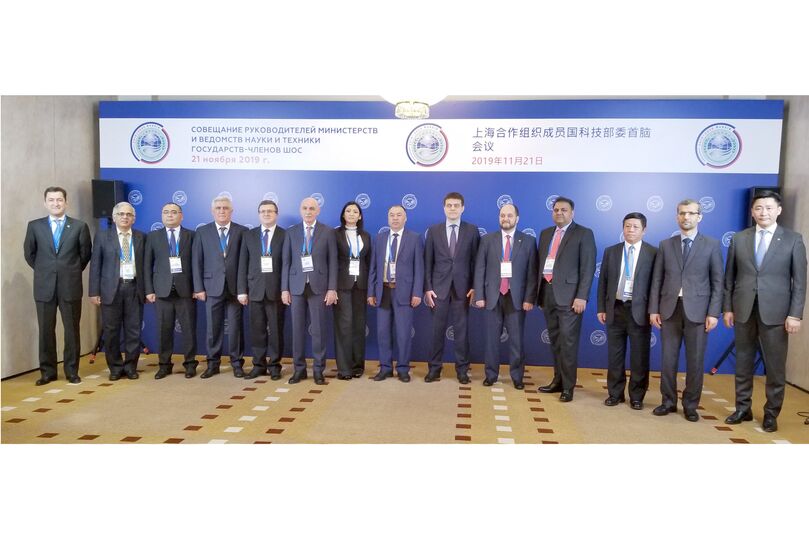On 26-27 November Tashkent hosted an international workshop on the application of new technologies in transiting facilitation for enhancing the transport connectivity of the land-locked developing countries in Central Asia.
The event was co-organised by the SCO Secretariat, UN Economic and Social Commission for Asia and the Pacific (UNESCAP) and Uzbekistan's Ministry of Transport.
The workshop was attended by about 30 participants: experts from SCO member-states' ministries of transport and customs authorities, shippers' associations and forwarding agencies as well as trucking companies.
The event was organised in line with the Memorandum of Understanding between the SCO Secretariat and UNESCAP of 2015 with a view to enhancing the knowledge and skills of the relevant authorities' personnel in the SCO countries and apply new technology to facilitate transiting transportation.
The participants also held a constructive dialogue on the state of affairs, current problems and prospects for developing international transport in Central Asia.
During the opening of the workshop, an SCO Secretariat representative read out a welcome address by SCO Secretary-General Vladimir Norov to workshop participants.
In his message the Secretary-General noted that he gives a special importance to multilateral cooperation in transport and communications, the development of transport infrastructure and the implementation of joint projects in the region. This is why the SCO Development Strategy until 2025 as well as the Bishkek and Quingdao SCO summit declarations underscored the importance of deepening cooperation in transport, including upgrading the existing transport corridors and creating new ones, constructing multimodal logistics centres, and creating an industrial cluster network along transport arteries.
Vladimir Norov pointed out that a broader use of available transport capacity had also been provided for by the documents signed as a result of the Tashkent SCO Heads of Government Council meeting this year, namely by the new Program of Multilateral Trade and Economic Cooperation between the SCO member states, the Concept for Cooperation between Railway Administrations of the SCO Member States, the Memorandum Between Customs Services of the SCO Member States on Mutual Integration of National Transit Systems, as well as the decision to prepare a framework agreement between the governments of the SCO member states on creating a system for integrated control over transport services.
The SCO Secretary-General emphasised Central Asia's important geostrategic position that allows it to connect major international markets, which also provides conditions for joining efforts by the countries in the region in order to accelerate its integration into the system of international transport corridors.
According to the message, a new level of quality transport communication between regional partners can be reached by implementing earlier understandings in transport and by solving a number of problems in this area that are common to the SCO countries. These include infrastructure development at the logistics centres connecting different types of transport, upgrading existing networks and transport facilities, and expediting the cooperation and unification of transport standards as well as phytosanitary regulations.
Vladimir Norov emphasized that the SCO and some of its member states have significant experience in developing transport systems and in building multimodal logistics facilities. Given this, he initiated drawing up a Programme of Cooperation between the SCO Countries in the Construction of Multimodal Transport and Logistics Centres, which would help develop the infrastructure of logistics facilities and expedite the cooperation and unification of transport standards and phytosanitary regulations.
Greater interaction with the UNESCAP, especially in transport, energy and trade, as mentioned in the Secretary-General's welcome remarks, is a priority of the SCO's international activities; this was also pointed out by the SCO prime ministers at the recent meeting of the SCO Heads of Government Council in Tashkent.
The Secretary-General lauded the current engagement with the UNESCAP and expressed hope that with its considerable experience in planning and carrying out its policy of transport interconnection in the Asian-Pacific region, that it would assist the SCO in working out these programmes.
ESCAP experts gave presentations on current world practice in facilitating transiting cargo carriage by motor vehicle and railway and the adoption of cutting-edge technology in this area in the EU, ASEAN and South America. They also familiarised the participants with the use of satellite and GSM systems for tracking vehicles, electronic seals for containers, paperless information exchange between adjacent countries' agencies and the concept of a digital freight platform intended to remove the barriers and streamline administrative procedures when freight crosses national borders.
The workshop has vividly revealed the SCO member states' growing interest in the more comprehensive development of multilateral cooperation in transport and communications, including in the application of state-of-the-art methods and technologies for easier cargo transport.
As a follow-up to the workshop, the participants came up with recommendations and spoke in favour of regular activities to serve as a platform for learning the latest trends in the development of cargo transport, detailed discussion of current issues in this area and proposing new ideas with a view to enhancing the transport potential within the SCO.
The international workshop on the application of New Technologies in Transit Facilitation for Enhancing Transport Connectivity of LLDCs in Central Asia is a joint event of the SCO Secretariat, UNESCAP and the Ministry of Transport of the Republic of Uzbekistan and is organized under the Memorandum of Understanding between the two international organisations, dated 2015.
The UNESCAP is the largest of the five UN regional commissions that searches for resolutions to the economic and social issues of the Asian-Pacific region.
